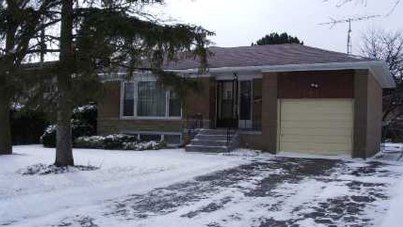 That's right. A bungalow in north Toronto sold earlier this month for $421,800 over the asking price. The home was listed at $759,000 and sold in multiple offers for a whopping $1,180,800.
That's right. A bungalow in north Toronto sold earlier this month for $421,800 over the asking price. The home was listed at $759,000 and sold in multiple offers for a whopping $1,180,800.
According to an article from today's CBC News (reposted in full, below), there were a total of five bids above $1 million dollars. This tells us that the successful purchaser wasn't alone in their seven figure valuation of the property.
Needless to say, there's been plenty of attention from the media, realtors, and the home buying public over the last few weeks.
The price isn't the only reason this story is generating so much hoopla though. The location and style of the home are notable as well.
Remember, we're talking about a bungalow... in north Toronto...
Would the reaction have been as strong if this was a 3-storey detached in The Beach? Or a mansion in the Annex?
Or what about Queen West? A colleague of mine just listed a stunning million dollar property there. I popped into the agent's open house today and the place really is impressive - something right out of Architectural Digest. Now that is the kind of property (and location) that could sell for a significant price without all the accompanying hullabaloo.
Okay, we've looked at price, location, and style of home. From what other angle can we view this north-Toronto bungalow sale? How about the type of buyer involved in the purchase? That's the focus of today's CBC News article. Check it out...
-----------------------------------------------------------
Offshore Buyers Pricing Canadians out of Housing Market
Globe & Mail | By Prithi Yeljaj | March 15, 2012
Overseas investors are snapping up properties in Canada's largest cities, driving up prices and pushing ordinary Canadians out of the housing market, observers say.
Real estate experts call it the "new reality," and the high price paid for a north Toronto bungalow is the latest evidence.
This month, the three-bedroom bungalow, circa the 1960s and without much updating, sold for $421,800 over the asking price, creating a buzz among agents and other buyers.
Located in Willowdale, where similar detached houses typically sell for just short of $900,000, the bungalow at 300 Dudley Ave. was listed at $759,000.
The winning bid of $1,180,800 came from a university student whose parents live in China and own a business in San Francisco. There were four other bids of more than $1 million.
Michael Adelson represented the seller of the Willowdale bungalow.
"The initial response was quite vociferous," said Michael Adelson, a Re/Max agent who represented the seller and received several phone calls about the deal after it was done.
"There's a lot of anger among Canadians who earn money here that they've been priced out of the market. There is some degree of anxiety about how people are going to compete with these hyper-inflated prices."
'Outrageous and borderline bizarre'
Adelson declined to discuss the specifics of the Willowdale deal, citing client confidentiality.
But CBC business commentator Michael Hlinka called the deal "outrageous and borderline bizarre."
The strong reaction to the price likely stems from how it changes the vision of affordability for average Canadians, he said.
Property markets in other large cities, such as Vancouver and Calgary, are undergoing similar pricing shocks, he said.
“We’re looking at this through a prism of our expectations growing up in Canada in the 1950s, '60s and '70s, when part of the Canadian dream was that you would own your own single-family home," Hlinka said. "But as Canada matures, we’re going to be looking at a new reality, where that may be out of reach. And I don’t think you can turn back the clock.”
Brad Lamb says people who live in downtown Toronto will have to be rich or settle for condos. (Brad Lamb Real Estate)
Toronto real estate mogul Brad Lamb said Canadians' home-buying expectations have to change, but he doesn't believe that overseas investors are to blame.
The scarcity of the product — in this case, single detached homes — is key, he said. And as the Toronto population grows and land available for new houses becomes scarce, the competition for these homes will become even more intense.
Condos are the alternative. Already, they're the norm for families wanting to live in the central cores of cities such as New York and Chicago, he said.
"It's an illusion for people to think they can live in downtown Toronto in a detached home and not be wealthy," Lamb said. "Ordinary people can't live in central London or central Paris or central New York.
"If you want to live in central Toronto, you're going to have to live in a condo or be a millionaire. That's the reality. ... It's not a bad thing. It's the way cities evolve."
Steve Matthews, a Re/Max agent in Toronto, says inflated prices make it harder for ordinary Canadians to buy houses. (Steve Matthews)
Inflated prices, such as the price fetched by the Willowdale bungalow, do make it difficult for ordinary Canadians to get into the market, no matter who buys the house, said Steve Matthews, a Re/Max agent in north Toronto.
"It skews the market. Now, the person who lives next door and the person who lives down the street think they should get that price, too. It also generates resentment because it makes it tougher for everyone — buyers, agents, banks — so there is a ripple effect that goes beyond the immediate sale."
Foreign students drive market
As more people get exposure to Canada as an offshoot of globalization, the overseas investor market will rise, Hlinka said. As an instructor at George Brown College in Toronto, he has seen an explosion in the number of foreign students.
“When their parents come to visit, they get an idea of what real estate costs here, and they can’t believe how cheap it is. They want to buy because they think it’s a bargain.”
In addition to China, investors pouring money into real estate are flocking to Canada from the Middle East, Korea, Russia, India and the Philippines as well, said Tony Ma, who owns HomeLife Landmark Realty in Markham.
Tony Ma, owner of HomeLife Landmark realty, says buyers from China find Canadian housing prices low, compared with what they pay at home. (Tony Ma)
About 65 per cent of Ma’s agents are Chinese and the bulk of his business comes from Chinese clients. Most are new immigrants to Canada, but about 20 per cent are foreign investors, including parents overseas who buy on behalf of their children studying in this country.
Fewer than five per cent are pure investors with no ties to Canada, said Ma, a former neurosurgeon who moved to Toronto from Zhengzhou, China, in 1998.
"Most of our buyers are part of Canadian culture. I don’t think they are going to push local Canadian people out of the market. When immigrants come to Canada today, they have money, not like when I came to Canada 20 years ago. I didn’t have money."
Last year, buoyed by his strong ties to the mainland China market, Ma’s agency sold 263 homes priced at more than $1 million, with about 40 per cent of those being all-cash deals with no conditions attached.
Chinese drawn to Canada
Canada’s stable government and banking system and the relatively low prices draw investors, he said, pointing out that while condos in downtown Toronto can sell for $800 per square foot, in Beijing, the price is $2,000 per square foot and in Hong Kong it's double that.
Moreover, to control prices, the Chinese government allows each family there to bank finance only two properties — one to live in and one to invest in — and buyers must pay 100 per cent cash for anything above the two-property limit, Ma said.
Not only are prices in Canada more affordable, homes and condos are a better value proposition, since they come ready to move into, unlike in China, where buyers get a concrete shell they have to pay to finish, he said.
“So they see an $8 million house here, they see the quality, they see the finishes and they think it’s cheap," Ma said. "They can move in today.”
Vancouver tops the list with Chinese investors because of the city’s temperate climate and proximity to their homeland, he added.
Janet Sinclair of Re/Max Hallmark Realty Ltd. in the Beaches neighbourhood of Toronto, routinely deals with foreign investors.
“They have driven prices up," she said. "Whenever we launch a new condo downtown we get a number of Hong Kong investors and a lot of people coming over from England. People want to put their money in Canadian real estate because they think it’s safe.”
Sinclair recently dealt with a Hong Kong investor representing a dozen buyers, who happened to be family members from back home. They snapped up units in a new waterfront condo building and are now interested in another project in the Beaches.
She also recently sold a penthouse condo in downtown Toronto to Swiss investors for $1.25 million.
“They didn’t bat an eye at the price. They said in comparison to what they pay in Switzerland, these prices are nothing. Our prices are not scaring them at all."
Builders tearing down old houses
The Willowdale buyer who paid the premium price is stinging from the negative reaction to the sale and declined to be interviewed.
Adelson said the Yonge Street corridor between Highway 401 and Finch Avenue is in demand because of the subway and its proximity to York University and Seneca College. Along with a thriving retail strip and a planned new Whole Foods, 10 new condominium projects are in the works.
The area is a magnet for certain ethnic groups, including people from the Middle East and China, Adelson said.
"It's a cultural thing. Their communities are already there. If you go down to the Danforth, their stores are not there, so that's not as attractive a location for them."
The area is also rife with redevelopment as builders tear down older homes and replace them with monster houses or two smaller units.
That’s just what a buyer from China, who recently bought a tear-down bungalow in the area for $720,000, plans to do, said Al Sinclair, the Hallmark Realty sales representative who sold him the property.
The buyer became familiar with the area through visiting his daughter, a doctor who lives there. He plans to rent out the house for two years until his building plans are approved, then tear it down and build several townhouse units.
“He thinks the Toronto real estate market has a long way to go," Sinclair said. "He’s right."
Only pockets of Toronto are of interest to overseas investors, including North York and the downtown core and not areas like Leslieville in the east end, Adelson said. Although that neighbourhood is considererd hot and the property values are rising, it has not experienced the overheated bidding wars seen farther north.
If you’re thinking of making a move and would like to know how I can help, feel free to contact me for more info.
 The last few weeks in August are similar to the last few weeks in December in that these are the two times of year when a relatively large portion of the real estate market (buyers, sellers, and realtors) are away on vacation.
The last few weeks in August are similar to the last few weeks in December in that these are the two times of year when a relatively large portion of the real estate market (buyers, sellers, and realtors) are away on vacation.
 A couple of months ago I wrote a blog post asking the question, "Sellers: Should you have a pre-listing home inspection done?" (read it
A couple of months ago I wrote a blog post asking the question, "Sellers: Should you have a pre-listing home inspection done?" (read it  That's right. A bungalow in north Toronto sold earlier this month for $421,800 over the asking price. The home was listed at $759,000 and sold in multiple offers for a whopping $1,180,800.
That's right. A bungalow in north Toronto sold earlier this month for $421,800 over the asking price. The home was listed at $759,000 and sold in multiple offers for a whopping $1,180,800.
 I don't really do much "ranting" on this blog, but every now and then something comes up that compels me to throw in my 2 cents...
I don't really do much "ranting" on this blog, but every now and then something comes up that compels me to throw in my 2 cents... In the city of Toronto there are realtors who focus specifically on condos, and there are realtors who focus specifically on houses. There's a third group as well - the realtors who focus on both condos and houses. I'm one of those guys. Condos and houses each offer their own unique set of challenges, opportunities, and rewards. I can't imagine giving up one for the other.
In the city of Toronto there are realtors who focus specifically on condos, and there are realtors who focus specifically on houses. There's a third group as well - the realtors who focus on both condos and houses. I'm one of those guys. Condos and houses each offer their own unique set of challenges, opportunities, and rewards. I can't imagine giving up one for the other. On Tuesday I helped a client of mine purchase a great 2 bedroom + den/2 bathroom condo in
On Tuesday I helped a client of mine purchase a great 2 bedroom + den/2 bathroom condo in  In the Toronto real estate market, tenanted properties come up for sale all the time. Listings for houses with basement tenants, for example, are quite common. And there’s certainly no shortage of renter-occupied condos for sale. There’s one very important distinguishing question for the potential buyer of such a property though, “Can I take vacant possession or do I have to assume the tenant?”
In the Toronto real estate market, tenanted properties come up for sale all the time. Listings for houses with basement tenants, for example, are quite common. And there’s certainly no shortage of renter-occupied condos for sale. There’s one very important distinguishing question for the potential buyer of such a property though, “Can I take vacant possession or do I have to assume the tenant?” I showed a property to some clients of mine a few weeks ago, a fixer-upper in the
I showed a property to some clients of mine a few weeks ago, a fixer-upper in the 